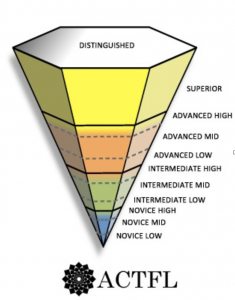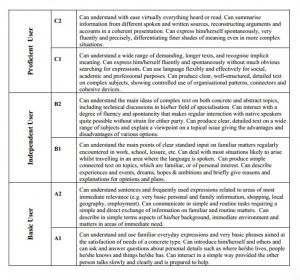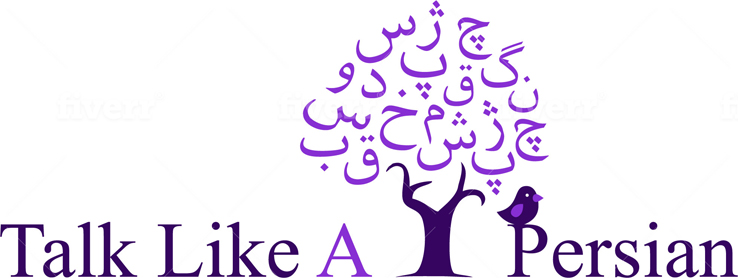Proficiency is measured in terms of receptive and expressive language skills, syntax, vocabulary, semantics, and other areas that demonstrate language abilities. There are four domains to language proficiency: reading, writing, speaking, and listening. Your language proficiency level can be measured by one of the following scales:
- ACTFL -American Council on the Teaching of Foreign Languages Proficiency Scale
- IRL -Interagency Language Roundtable Scale
- CEFR- Common European Framework of Reference
Language proficiency is a continuum, and any attempt to divide that continuum up into distinct levels of proficiency will be imperfect.
American Council on the Teaching of Foreign Languages Proficiency Scale (ACTFL)
The ACTFL Proficiency Guidelines are a description of what individuals can do with language in terms of speaking, writing, listening, and reading in real-world situations in a spontaneous and non-rehearsed context. Developed from the ILR scale, the ACTFL scale identify five major levels of proficiency: Distinguished, Superior, Advanced, Intermediate, and Novice for each skill. The major levels Advanced, Intermediate, and Novice are subdivided into High, Mid, and Low sub-levels.

Unlike the ILR, ACTFL does administer formal proficiency tests. They offer oral proficiency tests in more than 100 languages, and also administer separate tests for measuring listening, reading, and writing proficiency. You can learn more about these tests on the ACTFL site here.
ACTFL Proficiency Tests
- The ACTFL Oral Proficiency Interview (OPI) is a valid and reliable means of assessing how well a person speaks a language. It is a 20-30 minute one-on-one interview between a certified ACTFL tester and an examinee. The interview is interactive and continuously adapts to the interests and abilities of the speaker. Official ACTFL OPIs are currently available in the following languages (but are subject to change): Afrikaans, Akan-Twi, Albanian, Amharic, Arabic, Armenian, Azerbaijani, Baluchi, Bengali, Bosnian, Bulgarian, Burmese, Cambodian, Cantonese, Cebuano, Chavacano, Czech, Dari, Dutch, Egyptian, English, French, Georgian, German, Greek (Modern), Gujarati, Haitian Creole, Hausa, Hebrew, Hindi, Hmong/Mong, Hungarian, Igbo, Ilocano, Indonesian, Iraqi, Italian, Japanese, Javanese, Kazakh, Kashmiri, Korean, Kurdish, Lao, Levantine, Malay, Malayalam, Mandarin, Marshallese, Nepali, Norwegian, Pashto, Persian Farsi, Polish, Portuguese Punjabi, Romanian, Russian, Serbian Croatian, Sindhi, Sinhalese, Slovak, Somali, Spanish, Swahili, Swedish, Tagalog, Tajik, Tamil, Tausug, Telugu, Thai, Tigrinya, Turkish, Turkmen, Uighur, Urdu, Uzbek, Vietnamese, Wolof, Wu and Yoruba.
- OFFICIAL ACTFL ORAL PROFICIENCY INTERVIEW– COMPUTER (OPIC) is an internet delivered test which provides valid and reliable oral proficiency testing on a large scale. It was developed in response to the increased worldwide demand for the testing of oral language proficiency. The computer delivered assessment emulates the ‘live’ OPI, but delivery of questions is through a carefully designed computer program, and via a virtual avatar. Thus the test can be taken on demand, and at at a time convenient to the candidate and proctor. Official ACTFL OPIcs are currently available in the following languages: Arabic, Bengali, English, French, German, Indonesian, Korean, Mandarin, Pashto, Persian Farsi, Russian, Spanish and Tagalog.
Schedule a Formal Test
Do you want to a formal assessment to assess your proficiency level? click on the following links.
Click here to schedule a test in your favorite language
Click here to select the Persian test you would like to get certified in.
Interagency Language Roundtable Scale (ILR)
The Interagency Language Roundtable scale is a set of descriptions of abilities to communicate in a language.Originally developed by the U.S. State Department’s Foreign Service Institute (FSI). It is the standard grading scale for language proficiency in the United State’s Federal-level service.The scale grades people’s language proficiency on a scale of 0–5. The designation 0+, 1+, 2+, 3+, or 4+ is assigned when proficiency substantially exceeds one skill level but does not fully meet the criteria for the next level. Grades may be assigned separately for different skills such as reading, speaking, listening, writing, translation, audio translation, interpretation, and intercultural communication
ILR Levels
- 0 – No Proficiency
- 1 – Elementary Proficiency
- 2 – Limited Working Proficiency
- 3 – General Professional Proficiency
- 4 – Advanced Professional Proficiency
- 5 – Functionally Native Proficiency
There is no actual “ILR exam”. The ILR does not actually administer tests. Rather, various government agencies use the ILR proficiency descriptors as a common measure of performance on their own specific language exams. While ILR-based tests are only available to U.S. government employees, the ILR does offer self-assessments, which you can find here .https://www.govtilr.org
Common European Framework of Reference (CEFR)
Designed by the Council of Europe, the CEFR is widely accepted as the European standard for measuring language proficiency. The framework consists of 6 levels, with fully elaborated descriptors and can-do statements for reading, writing, listening, and speaking. A global scale is also provided to make it easier to communicate the system to non-specialist users and to provide teachers and curriculum planners working in different countries and languages with common orientation points:

Image from Council of Europe Similar to the ILR, the Council of Europe does not offer a “CEFR exam”. Various testing centers and universities throughout Europe offer their own exams, aligned with the CEFR scale.
The ACTFL, ILR, and CEFR proficiency scales each emphasize slightly different aspects of language proficiency and establish boundary markers at different points along that continuum and they are not strictly comparable.
References
“ACTFL Proficiency Guidelines 2012.” ACTFL Language Connects. https://www.actfl.org/publications/guidelines-and- manuals/actfl-proficiency-guidelines-2012
“ILR Proficiency Levels.” Foreign Language Program . https://www.icls.edu/foreign-language-programs/ilr-proficiency-levels/
“The CEFR Levels.” Council of Europe. https://www.coe.int/en/web/common-european-framework-reference-languages/level-descriptions#:~:text=The%20CEFR%20organises%20language%20proficiency,needs%20of%20the%20local%20context.

